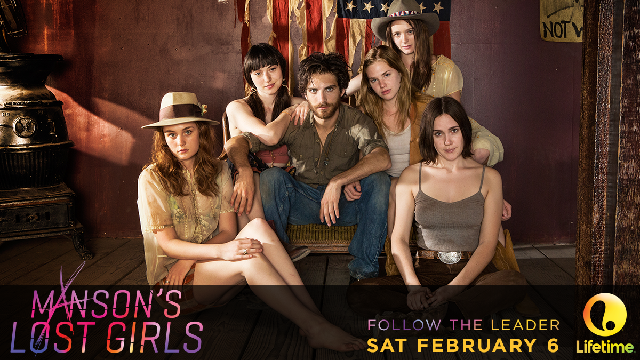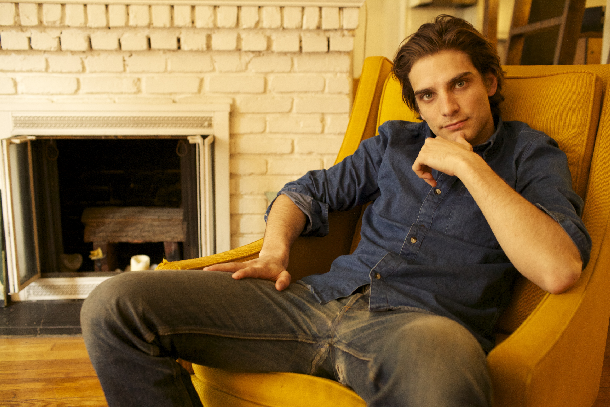Equally criticizing convicted criminals for their heinous crimes, and blaming victims for making seemingly unfortunate choices that led them to be targets of those horrifying offenses, can be at times the easy route for the public to take when they begin analyzing high-profile atrocities. But actor Jeff Ward’s skilled abilities of showcasing the emotional motivations behind one of the 20th century’s most infamous criminals, Charlies Manson, in Lifetime’s new original movie, ‘Mason’s Lost Girls,’ naturally challenged the widely held perception that victims can be equally blamed for the misfortunes they face at the hands of their captors. In his portrayal of the notorious title cult leader in the crime thriller, Ward captivatingly showcased Mason was effortlessly able to target vulnerable young women who desperately wanted a sense of belonging, and turned their needs and desires against them.
‘Mason’s Lost Girls’ offers a unique look at Manson’s life and personality through the eyes of his cult members. The thriller follows Linda Kasabian (MacKenzie Mauzy) as she first arrives at the seemingly idyllic Spahn Ranch hippie commune, where she is embraced with open arms by the cult leader and his his followers, including Susan Atkins (Eden Brolin), Lynette ‘Squeaky’ Fromme (Grace Victoria Cox) and Leslie Van Houten (Greer Grammer). Seduced by the group’s free-love lifestyle, Linda revels in the sisterhood and acceptance, as well as her immediate attraction to Manson’s enforcer, Tex Watson (Christian Madsen). She’s also taken with Manson, who soon draws her into criminal activities, including late-night “creepy crawls” to steal from lavish homes.
Linda later reluctantly becomes an accomplice in Manson’s “Helter Skelter,” a drug-fueled murder spree that included the brutal death of actress Sharon Tate. While Linda only served as a driver and observer to the Tate-Labianca murders, while some of the other girls eagerly joined in the violence, she becomes increasingly disgruntled by her new lifestyle. She ultimately breaks away and turns herself in as a witness for the prosecution and helps to convict Manson.
Ward generously took the time recently to talk about portraying the title character in ‘Manson’s Lost Girls’ during an exclusive interview. Among other things, the actor discussed that while he believes Manson is guilty of committing multiple murders, he was also interested in playing the former cult leader in the cable network’s film because he wanted to show the deep and complicated side that led him to lead a life that was driven by crime. The performer also noted that he feels the drama serves as a cautionary tale that warns viewers to avoid situations where they can be targeted by people like Manson, who targets those who feel lost and want a purpose or a sense of belonging, and then uses their vulnerability against them.
ShockYa (SY): You portrayed the title character of Charles Manson in the new Lifetime Original Movie, ‘Mason’s Lost Girls.’ What drew you to play the leader of the Manson Family in the crime thriller?
Jeff Ward (JW): I was very excited to play him. His mind is such a deep and complicated puzzle and I was eager to portray that. Everyone knows that he is a monster, but I did some research to learn more about him and his past. He never had a father, and his first memory was visiting his mother in prison. When he was in first grade, his uncle thought he wasn’t “man enough” and forced him to wear a dress to school.
I found his story fascinating. While I think he is a monster who is guilty of nine murders, I also feel bad for him. So I wanted to show that side of his story as much as I could.
SY: In the movie, viewers get a unique look at Manson’s life and personality through the eyes of his cult members, particularly Linda Kasabian. Why do you feel it was important to revisit such an infamous moment of American history through the perspective of his followers, and highlight their experiences with him?
JW: I feel like this is important because it still happens today. There are still groups that prey on weaker minded people and take advantage of them. This reminded me of ISIS, who looks for people who feel lost and want a purpose or a sense of belonging, and then use their vulnerability against them just like Manson did.
I think the movie is kind of a cautionary tale; warning people to avoid situations like this and be aware of what is happening. It is important to look at this from the victim’s perspective because there are dangers in dismissing the victims as ignorant or drugged up or stupid-which they were not. They were normal people with problems that got involved with the wrong people. Things might seem peachy at first, but by the time you realize what’s happening, it might be too late.
SY: How much information did you know about Manson before you signed on to star in the crime thriller? What kind of research did you do in order to better understand his motivations?
JW: I knew very little about him going in. I thought that he was a serial killer, which turned out to be wrong because there is not any evidence that he actually killed anyone, or at least not any of the nine people he was sent to jail for killing. I did not know his real story and how unique it was compared to other crimes in US history, which is what makes it so fascinating.
I read and watched everything I could find on Manson. It is really rare to play a person that has that so much material written about them and that has so many interviews to draw information from. The only problem was that he acts very different in each interview. His accent and energy were constantly shifting and I found that it was difficult to hold on to in the beginning. There was so much information that a lot of it contradicted itself.
His beliefs and methods would notoriously change according to who he was talking to or where he was. While talking to a biker gang about protecting the family, Manson became a southern racist. But while trying to convince a California girl to come join the family, he was soft, sweet and caring and portrayed a California hippie. I really had to make my own judgements of what he would act like in 1969, since there is very little footage of him before he was arrested.
SY: ‘Mason’s Lost Girls’ was directed by Leslie Libman. What was your collaboration with her like as you prepared for the role, as well as when you filmed the drama?
JW: Leslie is excellent. She knew how hard I was working on this character, and gave me license to change things around to fit the narrative I was trying to construct, which I was really grateful for. She also let me do my weird, actor-y things to get into character, which was necessary for this part.
She also encouraged a lot of improv, which I think is very important for the feeling of the family, and I think you can sense it in the movie. There was such a connection between the whole cast that by freeing us up to say or do almost anything, I think we captured a lot of what it might have actually been like.
SY: The Manson Girls, including Linda Kasabian, Susan Atkins, Patricia Krenwinkel and Leslie Van Houten were played by Mackenzie Mauzy, Eden Brolin, Isabel Shill and Greer Grammer. Were you able to rehearse with your co-stars in order to build your characters’ relationships with each other?
JW: No, we were kind of thrown right in because of how short of the process was. We were extremely lucky because we all got along right away, which is not always the case with a large cast. We all showed up every day excited to share some new book or documentary we found about Manson. We were all passionate about this story and that really helped because we had to go to some dark and weird places together. I can’t say enough about all of those girls, as well as Christian Madsen and Garrett Coffey, as they were all amazing.
SY: While Manson strived to create an idealistic utopia for his followers to live in, one of the most intense sequences in ‘Manson’s Lost Girls’ is the killing lessons scene. What was the experience of approaching his emotions and rationale in that scene?
JW: Yeah, we called that scene “Murder School.” It was weird because he believed in it so much and was dead serious (no pun intended) about teaching these twenty-somethings how to murder people “for their own protection.” Manson was very racist, and that was one of the tougher things to get my head around when I was playing him. I just do not have that much hate in my heart to act in that way, so it took a lot of work to understand where he was coming from.
SY: While Linda is initially drawn to Manson and is seduced by the group’s free-love lifestyle and acceptance, she eventually breaks away the seemingly idyllic Spahn Ranch commune and turns herself in as a witness for the prosecution and helps to convict Manson. Do you think showing her change of ideals and decision to help the prosecution build a case against Manson is finally starting to give insight into her decisions, and giving a voice to those people he targeted?
JW: I think that Linda’s journey is representative of the audience’s experience while watching the movie. She is initially seduced by the ranch, which I think a lot of people would’ve been, had they been in her situation. Then she and the audience slowly start seeing all the red flags. Linda is kind of the hero of this story; she prevented more people from getting murdered by slowing down and misdirecting other “family” members on the night of the murders. Also, her testimony brought justice for the women and made Manson responsible for his actions.
When Manson was seven, there was a boy in his class that he didn’t like, so obviously he manipulated a few girls in the class to beat him up. When the principal questioned them, the girls said Manson told them to do so, but when Manson was questioned he said, “They did it, not me!” It was the same defense he used in court for these murders in 1971. If it weren’t for Linda’s testimony, than there would be a really good chance he would have gotten away with it.
SY: When the Manson Girls first began following him in the 1960s, they had to form a real-life, in personal relationship with him to be convinced to join him. Now, with technology evolving so rapidly, and with social media allowing people to more easily share personal information online, do you think more people could be targeted by someone like Manson?
JW: Absolutely. It is one of the reasons this story is so important today. Like I was saying earlier, this doesn’t happen to people overnight. It’s not like Manson was going up to people saying, “We’re going to kill a bunch of innocent people, come along!” It was much more progressive. At first he was preaching love and discussing how he was rejected by his parents and the government and felt vulnerable. He gave the people what they wanted to hear in order to lure them in slowly. I think social media will only make it easier for that to happen, so hopefully if people see this, they might have an easier time recognizing when someone is playing them.
SY: After you finished filming ‘Manson’s Lost Girls,’ what was the process of stepping away from his emotions and mindset? Has the role influenced your approach to your acting in the projects you have taken on since the drama finished filming?
JW: The timeline of my research went from when Mansons’s parents were born, all the way through the Labianca murders. I stopped there because that was my last scene in the movie and I did not want to know too much about the trial or Manson’s destiny while filming. Then after it ended, I finished a few of my books on Manson to get closure with the story.
There was a chapter in one of those books, called Charlie is Famous, that described Manson departure from jail to the courthouse with throngs of people yelling, reporters running, cameras flashing and him walking in the middle of everyone with a huge smile. I was devastated because I realized that he became more famous for infamy rather than for his dream of becoming a famous rock star. He says that music was very important to him, but I honestly think he just wanted the fame that came with being a rock star. It bummed me out, but I think using his story as a cautionary tale is the best way to prevent future Mansons from doing the same.

Written by: Karen Benardello

